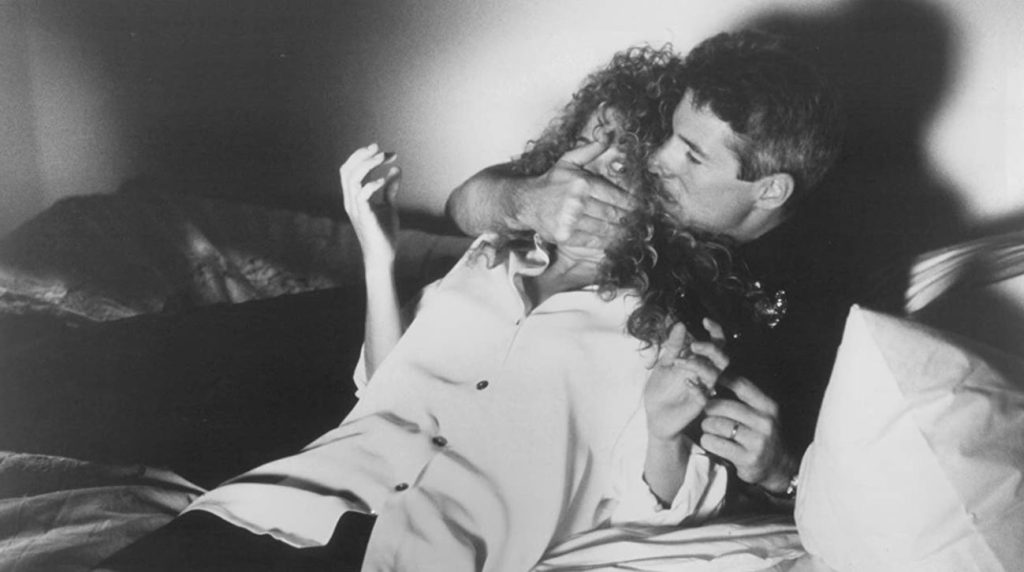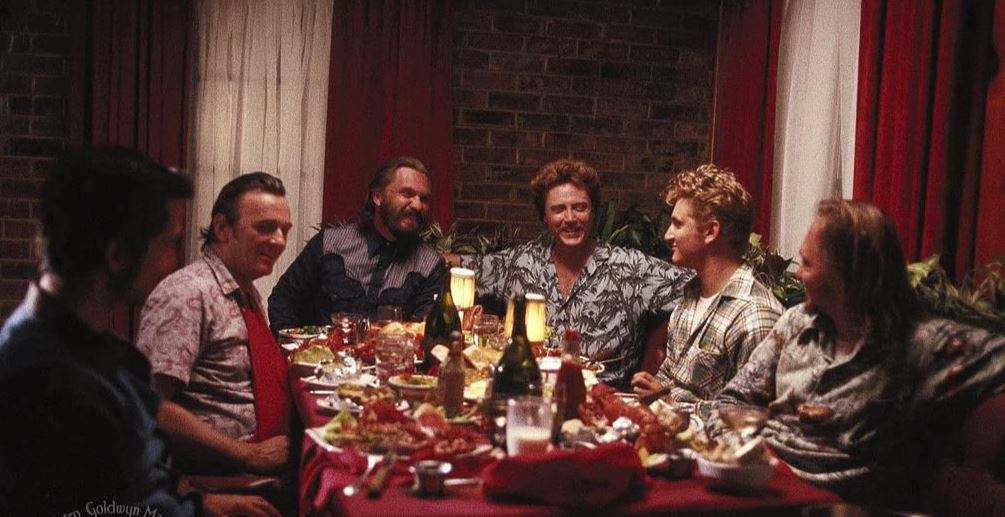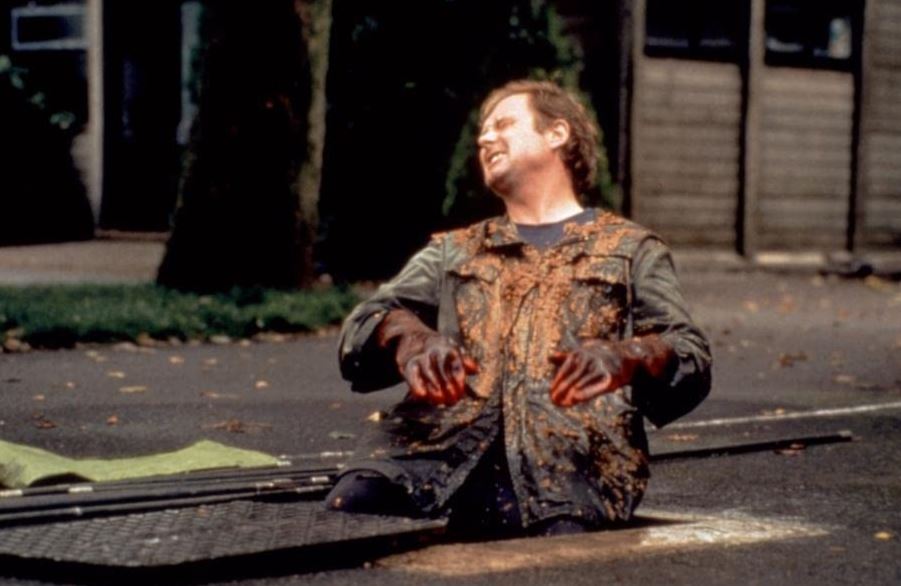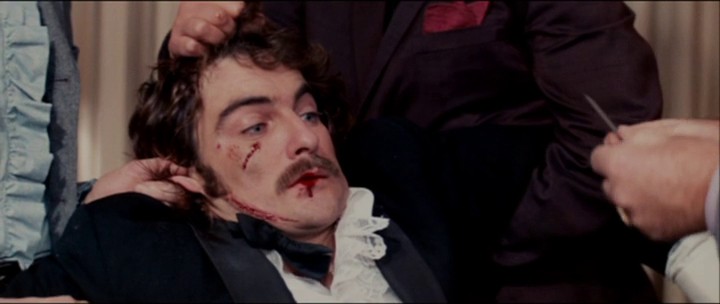
Brad Whitewood Sr. reveals his true colors in At Close Range (1986)
It takes more than an hour of this very nicely photographed neo-noir crime pic for Brad Sr. (Christopher Walken) to show he’s a nasty fucker. Up until then, he’s merely a thief, the leader of a tightly knit bunch of rural crims that specialize in stealing farm machinery. He’s a man with ‘kind of a rep’. Or as he tells his formerly estranged teen son Brad Jr. (Sean Penn) on a road trip through Pennsylvania: “Most people that drive through here, they see farms. Houses and fields and shit. I see money. Everywhere I go I see money. I see things that can move. Anything can move. It’s got my name writ on it.”
Even though he’s blood, Brad Sr. is reluctant to bring his wayward son into his successful criminal enterprise. His methods are too established to risk rocking the boat. It’s plain this hardcore recidivist is a fucking leech but he’s also organized, smart, practiced at covering his tracks and not too greedy. “I gotta see something in you,” he insists. “I gotta see you got something.”
Brad Jr. duly shows some quick thinking during a raid, but only starts to understand the depth of the quicksand he’s blundered into when he shares a ride with his dad, a gang member and a suspected narc by the name of Lester (Jake Dengel). Given booze and drugs, the frail, much older Lester is led into a river and held underwater as Brad Sr. dispassionately watches from the bank. Then he turns, stares at Brad Jr. and puts a finger on his lips. Rarely does a movie capture a character’s darkness so adroitly.
The box-office flop At Close Range proves an excellent two-hour watch. It’s got a terrific cast, convincing performances and a haunting Madonna single on the soundtrack. Most of all, it illustrates the dangers of biting off more than you can chew. Up until he witnesses an informer breathing water instead of air, Brad Jr. is a cocksure deadbeat. He’s happy to steal, smoke pot, drink underage, and get in people’s faces. Society only exists for his benefit while it’s clear he’s never grappled with boundaries or the slightest moral issue. The renewed contact with his dad greatly complicates matters, partly because Brad Sr. is a charismatic bastard who gives him a car and likes to show off a handgun, and partly because the teenager senses the need for a father figure to straighten him out. The mustachioed, gum-chewing Walken gives a magnetic turn in a picture that takes great care in building his malevolence. He’s occasionally boastful, flash and capable of a blood-chilling look but usually soft-spoken and languid. There’s no doubt he’s satanic, though. It’s just a question of how far Brad Jr. wants to wade into that quicksand.
But as their eyes lock by the riverside while a man loses his life, Brad Jr. starts to grasp he’s not a chip off the old block. It’s too late, though. Brad Sr. is neither a guy who responds well to rejection nor someone who appreciates having his liberty threatened.
His next move is among the vilest in eighties cinema.

The cuckolding cop Dennis Peck in Internal Affairs (1990)
“This happened to all of us, man,” Dennis tells a LAPD buddy who’s just shot dead an unarmed perp. “You’re not alone.”
A moment later Dennis is planting a knife on the body.
What a good guy. What a stand-up bloke.
But that’s Dennis. He’ll get you some lucrative moonlighting action, he’ll provide a shoulder to cry on, he’ll always fight your corner whether on duty or off.
Even though he might be squirreling away your wife’s panties and/or fucking her up the arse.
For that’s Dennis’ bag. Sex. Sex used as a means to control, to corrupt, to mark his territory, to taunt, to dominate and, most especially, to laugh at other men behind their backs.
As played by the excellent Richard Gere in his second best performance after Officer and a Gentleman, this treacherous horndog has got everyone’s number. Superficially patient and charming, nothing slips past him. It’s a treat to watch him give the slightest of pauses before delivering a headbutt, spitting out a glob of venom or demonstrating some other mastery of his brain-scrambling dark arts. He’s a composed, black-hearted alpha male who refuses to show his true nature until his finger is on the trigger.
Even then, you might not get a glimpse of his cloven hooves.

Tansey terrifies defenseless females in Raining Stones (1993)
I’ve previously banged the drum for Ken Loach’s superbly written masterpiece, Raining Stones. It’s a wonderful comedy-drama that balances working class grit and his lefty obsessions with a simple but compelling storyline. Bob Williams (Bruce Jones) is a decent guy down on his luck who borrows 150 quid to pay for his daughter’s communion dress.
Elsewhere, we’ve already got wind that the local loan shark Tansey (Jonathan James) is not to be taken lightly when his henchmen are seen smacking a hapless debtor outside some shops in broad daylight. Still, this little display of unpleasantness is nothing next to Tansey himself taking charge of business.
Bob’s wife Anne (Julie Brown) is at home with their young daughter making pastry in the kitchen when Tansey visits. There’s a knock on the door, the daughter answers and suddenly a smartly groomed guy with thick gold jewelry hanging off a wrist is in their living room. “What you doing?” Anne cries. “You don’t just come barging in somebody’s — ” A snarling Tansey jabs a finger at her. “Fucking shut it!” he bellows in her face. “You’ve got a dickhead for a husband and he owes me money!” From here on it’s a hideous master class in intimidation as one of his gorillas ransacks the upstairs. Anne’s bewildered tears (she knows nothing about the loan), the presence of a frightened child, and the fact he’s in their home have no bearing on the relentless abuse. Indeed, there’s no point appealing to his better nature coz he doesn’t have one. This is who he is and this is what he does. When nothing of value can be found, he sits in a chair, lights a fag and demands the rings off her fingers. “Pretty daughter, that,” he tells Anne as she begs to keep her wedding ring. “You want her to stay pretty?”
This is one of my all-time favorite changes of pace in film, partly because we’ve neither met nor seen Tansey beforehand. He just comes out of nowhere, a foul human whirlwind that blows into Anne’s home and leaves a trail of destruction. Worst of all, you know coarse parasites like him exist in real life and such scenes of havoc are routinely played out on British council estates.

Mummy’s boy Vic Dakin in Villain (1971)
Obviously based on 60’s nasty fucker Ronnie Kray, Vic (Richard Burton) is a shirt-lifting, cockney gangster. He doesn’t seem too comfortable with his sexual orientation, though, as his idea of foreplay is a punch in the guts. This need to dominate a winded, humiliated partner suggests self-loathing, a trait that most probably fuels his sadistic violence, of which there is a fair bit in this grimy crime outing. Pretty much straightaway Vic is laying into a pinioned croupier before slicing his face up with a straight razor. Once he’s completed his enjoyable handiwork it’s off home to his elderly mum to bring her a nice cup of tea and newspaper in bed.
Indeed, tending his finger and thumb is his only plus point. Otherwise he does a good job of projecting intense sourness, as exemplified by his contemptuous view of the common man: “Stupid punters, telly all the week, screw the wife on Saturday.” Despite being well dressed and a regular in London’s fanciest establishments, he’s got suspicious, darting eyes and a sweaty, semi-bloated face (no doubt caused by Burton’s real-life alcoholism). There’s threat, sarcasm and veiled menace in just about everything he says. Those in his orbit know it, too, reacting to his name or presence like a scorpion has crawled into their sleeping bag.
Still, Vic is not a rabid Neanderthal. He might possess an explosive jealousy and a curiously upside-down sense of morality, but he’s also intelligent, confident and careful. This is a man that knows who to beat up, who to blackmail and who to leave alone. In other words, Burton’s full-throttled portrayal is nuanced and convincing for a lot of Villain’s runtime. It’s certainly among his more unusual films and frequently bloody marvelous. Populated by wisecracking henchmen, corrupt, lecherous MPs, abused women, scared grasses, weary but dogged cops, and slippery rival gangsters, it plays like a sharply written, ultra-violent episode of The Sweeney that should be lapped up by Get Carter fans.